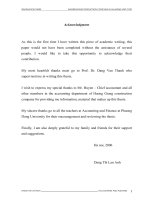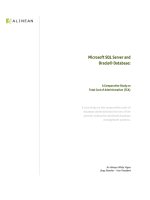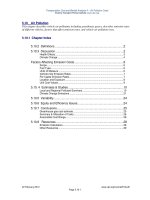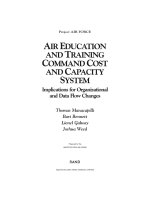Slides calculate total cost and incremental costs
Bạn đang xem bản rút gọn của tài liệu. Xem và tải ngay bản đầy đủ của tài liệu tại đây (306.55 KB, 50 trang )
Calculate Total Cost And
Incremental Costs
Principles of Cost Analysis and
Management
© Dale R. Geiger 2011
1
What if?
• Relationship between cost and unit of output
is neither fixed nor variable?
• There are multiple elements that affect the
cost of an output?
• A different type of cost relationship is relevant
to the decision at hand?
© Dale R. Geiger 2011
2
Terminal Learning Objective
• Task: Calculate Total Cost And Incremental Costs Given
Various Production Volumes
• Condition: You are a cost advisor technician with access to
all regulations/course handouts, and awareness of
Operational Environment (OE)/Contemporary Operational
Environment (COE)
• Standard: With at least 80% accuracy:
•
•
•
•
Describe multivariate (mixed) and incremental costs
Express total multivariate cost in an equation
Graph total multivariate cost over a relevant range
Express incremental cost in an equation
© Dale R. Geiger 2011
3
Cost Definitions
• Mixed Costs - A combination of fixed and
variable costs
Total Cost =
Variable Cost + Fixed Cost
• Also known as multivariate costs
© Dale R. Geiger 2011
4
Multivariate Cost Expressions
• Variable component:
• Variable $Cost per Unit * # Units
-Plus• Fixed component:
• Sum of relevant costs that remain the same
regardless of units of output
© Dale R. Geiger 2011
5
Multivariate Cost Example
• Relevant cost of transporting a unit for onlocation training is $350,000.
• Cost of training operations on-location runs
$20,000 per day.
• What is the unit of output?
• Days of training
© Dale R. Geiger 2011
6
Multivariate Cost Example
• Relevant cost of transporting a unit for onlocation training is $350,000.
• Cost of training operations on-location runs
$20,000 per day.
• What is the unit of output?
• Days of training
© Dale R. Geiger 2011
7
Multivariate Cost Example
• Relevant cost of transporting a unit for onlocation training is $350,000.
• Cost of training operations on-location runs
$20,000 per day.
• What is the cost expression for Fixed cost?
• Fixed cost = $350,000
© Dale R. Geiger 2011
8
Multivariate Cost Example
• Relevant cost of transporting a unit for onlocation training is $350,000.
• Cost of training operations on-location runs
$20,000 per day.
• What is the cost expression for Fixed cost?
• Fixed cost = $350,000
© Dale R. Geiger 2011
9
Multivariate Cost Example
• Relevant cost of transporting a unit for onlocation training is $350,000.
• Cost of training operations on-location runs
$20,000 per day.
• What is the cost expression for Variable Cost?
• Variable cost = $20,000/day * # of days
© Dale R. Geiger 2011
10
Multivariate Cost Example
• Relevant cost of transporting a unit for onlocation training is $350,000.
• Cost of training operations on-location runs
$20,000 per day.
• What is the cost expression for Variable Cost?
• Variable cost = $20,000 per day * # of days
© Dale R. Geiger 2011
11
Multivariate Cost Example
• Relevant cost of transporting a unit for onlocation training is $350,000.
• Cost of training operations on-location runs
$20,000 per day.
• What is the cost expression for Total Cost of
on-location training?
© Dale R. Geiger 2011
12
Multivariate Cost Example
• Relevant cost of transporting a unit for onlocation training is $350,000.
• Cost of training operations on-location runs
$20,000 per day.
• What is the cost expression for Total Cost of
on-location training?
• Total Cost = Variable cost + Fixed Cost
• Total Cost = $20,000 per day * #days +
$350,000
© Dale R. Geiger 2011
13
Graph of Mixed Cost
$K 700
600
500
400
$350K
Fixed Cost
300
200
100
0
0
1
2
3
4
5
6
7
8
9 10 11 12 13 14 15
X Axis = Number of Days
As Number of Days increases, Fixed Cost does not change
© Dale R. Geiger 2011
14
Graph of Mixed Cost
$K 700
Variable cost
for 10 days =
$20K per day * 10 days
= $200K
600
500
400
Fixed Cost
Variable Cost
300
200
100
0
0
1
2
3
4
5
6
7
8
9 10 11 12 13 14 15
X Axis = Number of Days
As Number of Days increases, Variable Cost increases
© Dale R. Geiger 2011
15
Graph of Mixed Cost
Total cost for 10 days =
$20K per day * 10 days +
$350K
or $550K
$K 700
600
$550K
500
400
Fixed Cost
Variable Cost
Total Cost
300
200
100
0
0
1
2
3
4
5
6
7
8
9 10 11 12 13 14 15
X Axis = Number of Days
As Number of Days increases, both Variable Cost and Total Cost increase 16
© Dale R. Geiger 2011
Questions
• What is the cost expression for Cost per Day?
• How would the graph of Cost per Day look?
• It should be a downward sloping curve that will
level out above $20K
© Dale R. Geiger 2011
17
Cost Definitions
• Semi-variable Cost - Costs that Increase as
Unit of Output increases, but not in Direct
Proportion
• Examples:
• Hours worked by an employee
• Miles driven
• Students in a course
© Dale R. Geiger 2011
18
Semi-Variable Cost Example
• Sometimes the Variable Cost per unit
remains the same only for a Relevant Range
• Example: Employee Wages
• Employee’s base wage is $15 per hour
• If the employee works more than 40 hours in a
week we must pay time and a half
© Dale R. Geiger 2011
19
Cost Expression for Semi Variable
• The cost expression for Total Wage Cost is:
1.5
Straight * Straight Time + Overtime *
*
Time Hours
$ per Hour
Hours
Straight Time
$ per Hour
© Dale R. Geiger 2011
20
Cost Expression for Semi Variable
• If the total number of hours worked is 30 and
straight-time rate is $15 per hour then:
1.5
30
0
*
Straight * $15 per Hour + Overtime * Straight
Time
Time Hours
Hours
$ per Hour
= $450
© Dale R. Geiger 2011
21
Cost Expression for Semi Variable
• If the total number of hours worked is 44 and
straight-time rate is $15 per hour then:
40
4
Straight * $15 per Hour + Overtime *
Time Hours
Hours
1.5
*
$15
per Hour
= $690
© Dale R. Geiger 2011
22
Graph for Total Wage Cost
1000
800
600
400
200
0
0
3
6
9 12 15 18 21 24 27 30 33 36 39 42 45 48 51 54 57 60
X Axis = # of Hours Worked
As # Hours Worked increases, total Wage Cost increases, but not uniformly
© Dale R. Geiger 2011
23
Graph for Wage Cost per Hour
25
20
15
10
5
This is known as a Step Function.
Cost per Hour for Hours 0-40 = $15
Cost per Hour for Hours 41-60 = $22.50
0
X Axis = # of Hours Worked
As # Hours Worked increases, Wage Cost per Hour remains the same for the relevant range
24
© Dale R. Geiger 2011
Questions for Thought
• What about a volume discount?
• Units 1-20 cost $10 per unit
• Units 21-50 cost $9 per unit
• Units 51-100 cost $8 per unit
• How would you express this cost relationship
• In total? On a per-unit basis?
• How would the graph of each look?
• What is the cost of 16 units? Of 67 units?
© Dale R. Geiger 2011
25









